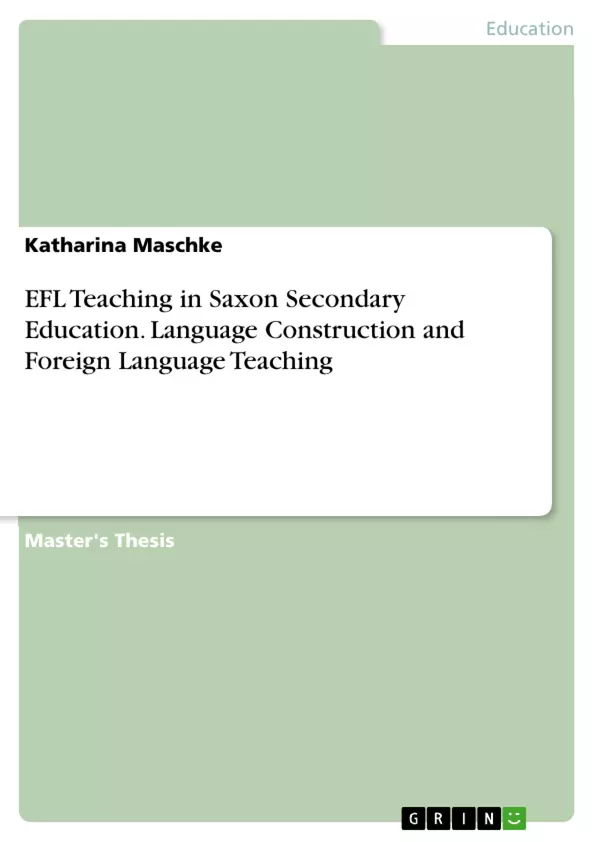Throughout this thesis, extensive literature research aims at answering the question of what benefits teaching language construction processes can bring to teaching English as a foreign language. As a more practical part, a curriculum is developed based on insights from the literature and the Saxon state curriculum as a framework for all teaching in Saxon state schools. After the presentation of the curriculum, this thesis discusses its content and the theoretical background, justifies the decisions in its development gives an honest overview of its advantages and challenges. In the conclusion, a presentation of limitations and implications completes the thesis.
Language construction describes the intentional development of a language. Even though this is often used for fictional works or linguistic experiments, the processes of language construction could also be used for natural languages. Not only does language construction require and foster the ability to reflect on language, meaning metalinguistic awareness; but it leads learners to an active engagement with the language. Learners would be given the toolset of metalinguistic awareness as an approach to all languages and language features they encounter.
Inhaltsverzeichnis (Table of Contents)
- Introduction
- Literature Review & Analysis
- Theory
- Second Language Acquisition
- Definition
- Explicit vs Implicit Knowledge
- Emerging Adulthood and Andragogy
- Language Teaching
- Contextual Factors
- Syllabus & Lesson Design
- Teaching Language
- Second Language Acquisition
- Linguistic Concepts
- Metalinguistic Awareness
- Language Systems
- Constructed Languages
- Overview
- Language Construction Processes
- Language Construction in Teaching
- Theory
- Methodology & Results
- Methodology
- Curriculum Presentation
- Discussion & Analysis
- Conclusion
- Limitations
- Implications
Zielsetzung und Themenschwerpunkte (Objectives and Key Themes)
This master's thesis explores an integrated approach to teaching English as a foreign language (EFL) in Saxon secondary education, focusing on the integration of language construction principles into the EFL curriculum. The author examines the theoretical foundations of second language acquisition, foreign language teaching, and constructed languages, ultimately aiming to develop and evaluate a practical curriculum framework that leverages language construction concepts for enhanced EFL learning.
- The interplay between explicit and implicit knowledge in second language acquisition
- The role of metalinguistic awareness in EFL learning
- The application of language construction principles in foreign language teaching
- The development and evaluation of a practical EFL curriculum framework incorporating language construction concepts
- The potential impact of the proposed curriculum on student learning and language acquisition
Zusammenfassung der Kapitel (Chapter Summaries)
- Introduction: This chapter introduces the thesis topic, outlining the importance of English proficiency in today's globalized world and the need for effective EFL teaching methods. The chapter highlights the significance of integrating conscious and unconscious learning processes in language acquisition, setting the stage for the exploration of language construction as a pedagogical tool.
- Literature Review & Analysis: This chapter provides a comprehensive overview of relevant theoretical frameworks, including second language acquisition, foreign language teaching, and constructed languages. It delves into the concepts of explicit vs. implicit knowledge, emerging adulthood and andragogy, and explores various language teaching approaches, syllabus design, and teaching methods. The chapter concludes with a discussion of metalinguistic awareness and language construction as valuable pedagogical tools.
- Methodology & Results: This chapter presents the methodology employed in the thesis, including the curriculum development process and the evaluation framework. It details the curriculum structure, objectives, and content, highlighting the integration of language construction principles. The chapter also discusses the results of the curriculum implementation, analyzing student responses and assessing the effectiveness of the proposed approach.
Schlüsselwörter (Keywords)
This master's thesis focuses on the key concepts of language construction, second language acquisition, foreign language teaching, metalinguistic awareness, and curriculum development. It explores the intersection of these areas to create an integrated approach to EFL teaching in Saxon secondary education, utilizing language construction techniques to enhance student learning outcomes. The thesis aims to contribute to the ongoing discourse on innovative and effective EFL teaching practices.
- Quote paper
- Katharina Maschke (Author), 2021, EFL Teaching in Saxon Secondary Education. Language Construction and Foreign Language Teaching, Munich, GRIN Verlag, https://www.grin.com/document/1331700



